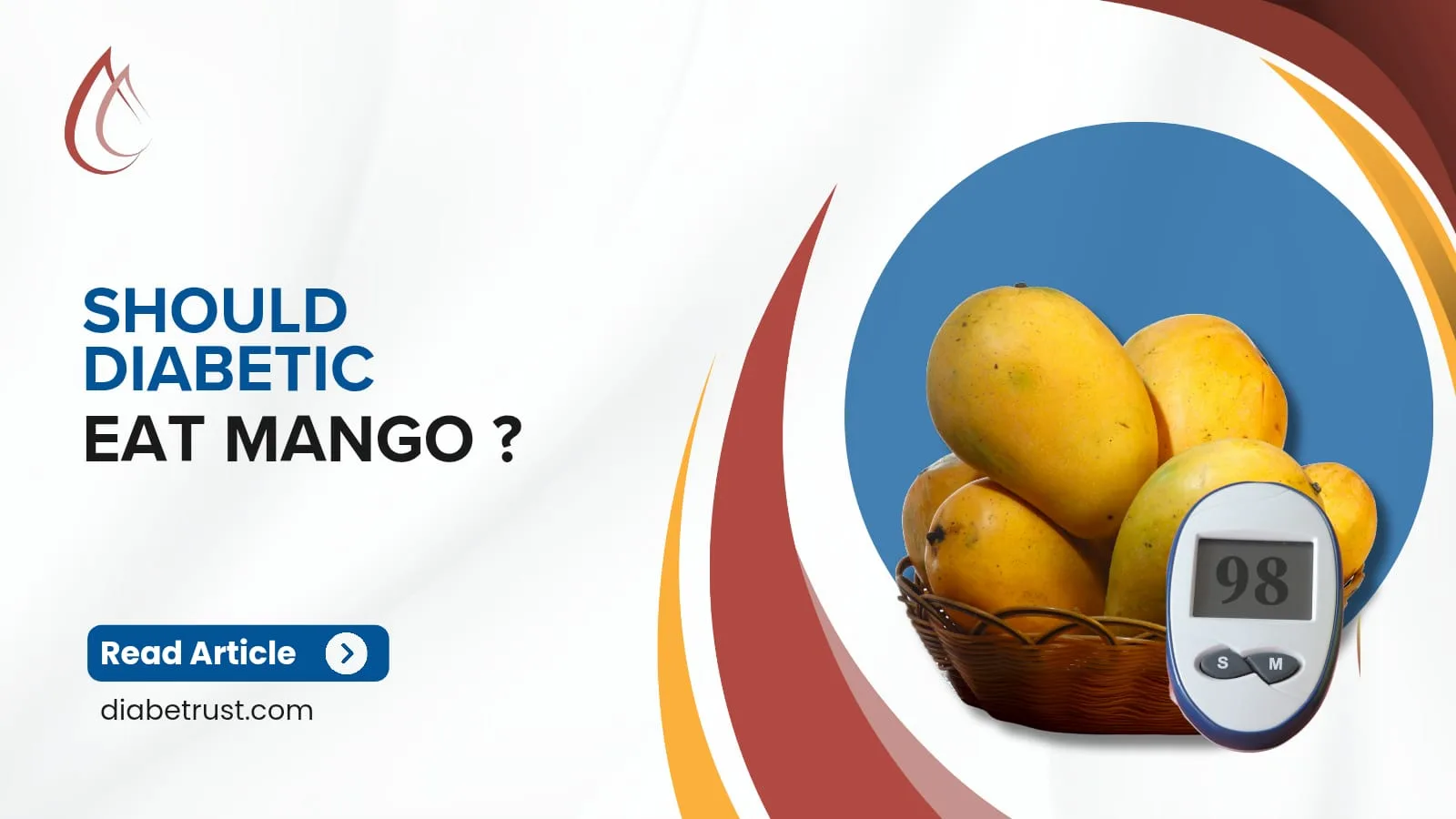Summary
Should diabetic eat mango? It is one of the most often asked questions in general. The mango, also known as the aam, is the king of fruits and is loved by all. However, if you eat too much of it, it may raise your blood sugar levels. Because, like other fruits, mangoes include carbs, which boost blood sugar levels in the body. However, another feature of mangos is that they are high in fiber, which helps to reduce the body’s absorption of sugar. Additionally, studies have shown that mangoes have a low to moderate glycemic index, which is good for everyone. Let’s dive deep into this article to understand it better.
Can Diabetic Patients Eat Mango?
Summer is known for its scorching sun and heat waves, but it also brings with it the delectable fruit known as mangoes, or aam. However, the question of whether or not people with diabetes can consume mangoes then emerges. Mangoes are a fruit that is high in fiber, antioxidants, and vitamins A and C, but eating them elevates blood sugar levels, which is troublesome for those who have diabetes. Therefore, should diabetics eat mangoes or not, and if yes, how much?
Can Diabetic Eat Mango Daily?

Although mangoes contain a lot of vitamins, fiber, and minerals, it’s always questionable whether a diabetic should eat mango daily. According to research, any food with a GI (Glycemic Index) of less than 55 is considered safe for consumption. Mangoes’ glycemic index is 51, making them perfectly safe for consumption. Individuals with diabetes can consume mangoes, but the recommended daily amount is 100 grams without any worry. Also, varieties like Pyari and Alphonso mangoes are considered beneficial to consume due to their low GI. However, it is still advised to consume the same in moderation.
Mango Glycemic index
The next challenge is the glycemic index, which, according to the GI rating system, ranges from 0 to 100.
- Low glycemic index- 0 to 55
- Medium glycemic index- 56 to 75
- High glycemic index- 76 to 100
It is noteworthy that the glycemic index (GI) of mangoes is dependent on their ripeness; the riper the mango, the higher the GI. Therefore, individuals with diabetes should consume mangoes that are slightly less ripe. Mangoes are low in glycemic content and contain less blood sugar, which will not have any side effects. Should diabetic eat mango or not depends on its glycemic index too.
5 Ways Diabetic Can Eat Mangoes
Mangoes have a high natural sugar content, which can be dangerous for diabetics as it raises blood sugar levels generally. However, if you follow these easy instructions, you can still enjoy mangoes.
- Consume in moderation—Mangoes have a high sugar content, so it’s best to eat them in moderation.
- Have a smoothie—To help balance your blood sugar levels, make a smoothie with spinach, chia seeds, avocado, and other healthy fats.
- Pair with protein—Mangoes do not contain protein; to lessen the body’s absorption of blood sugar, combine foods high in protein, such as cottage cheese and Greek yogurt, with mangoes.
- Salads—Mangoes can be included in salads as a source of healthy fats and fiber.
- Mango chutney- You can also make mango chutney with spices and condiments.
Because of their high nutritional content, mangoes are always a good choice—just be sure to eat them in a way that is diabetic-friendly if you have diabetes.
Conclusion
The answer to should diabetic eat mango or not is resolved. Yes, there are still ways to enjoy mangoes without feeling guilty. It’s important to keep in mind that mangoes are packed with nutrients that are good for us during the summer’s intense heat. As a result, eating mangoes is recommended for people with diabetes; however, you should exercise caution when ingesting them.
- Mangoes lose a lot of fiber when they are juiced, so they should be eaten whole for maximum benefits.
- Limit your intake to tiny amounts.
- Mangoes go well with kiwis or any other fruit that is high in fiber.
- Don’t eat overly ripe mangos.
FAQ
Q) How much protein is in 1 mango?
Mangos contain 2.8 grams of protein, which is negligible compared to other fruits. However, to maintain blood sugar levels, we recommend pairing them with nuts and other protein sources, like yogurt.
Q) Should Diabetic Eat Mango as a standalone snack?
No, it is preferable not to eat it as a standalone snack; rather, you can pair this sweet fruit with nuts like almonds to balance your blood sugar level.
Q) Is green mango good for diabetes?
Yes, green mangoes are beneficial for diabetics due to their low glycemic index. However, diabetes nutritionists advise against giving overripe mangoes to people with type 1 or type 2 diabetes.
Q)Should diabetic eat mango on an empty stomach?
The answer to the question, Should diabetic eat mango on an empty stomach? The answer is no, as it can quickly spike their blood sugar levels. Instead, pair it with yogurt, nuts, or healthy fats.
Q) Are mangoes safe for diabetics?
Mangoes are completely safe for diabetics because they are packed with nutrients, minerals, and vitamins that are very good for your body. However, if you have diabetes or any other illness, you should only eat mangoes in moderation to avoid any negative effects on your health.
Q) Does mango increase the sugar level in your body, and should diabetic eat mango?
Yes, this is true in that, similar to other fruits, mangoes are high in carbohydrates, which raise blood sugar levels. Nonetheless, they contain fibre, which aids in limiting blood absorption, as well as a variety of vitamins and nutritional qualities that are really good for your body.
Q) Should Diabetic eat Mango at any time of the day?
There is no set time for eating mangoes; individuals from all over the world eat them for breakfast, lunch, or dinner whenever it is most convenient for them. Although many people prefer to eat mangoes during the night or at dinner, it is preferable to eat them in the morning and afternoon rather than at night. There is no such thing as the perfect time to consume mangoes, but for those with diabetes, having them during a meal and as an evening snack is the best. One more thing: Because mangoes are acidic, it is best to avoid eating them right after a meal.
Q) Should a Diabetic Eat Mangoes in the summer?
Mangoes have several health benefits that come with them. Here are just a few.
They improve heart health because they contain potassium, which helps the heart circulate blood throughout the body efficiently.
Bolster the immune system, and
Aids with digestion
Encourage bone health.
For nutrition reasons, it is always advisable to consult physicians or dietitians before adding mangoes to your diet.
Q) Should Diabetic Eat Mangoes to prevent dizziness?
Yes, in certain cases, mangoes help prevent dizziness, but it is important to evaluate the root cause of diabetes. If it is high blood sugar, you can eat a few slices, but it is recommended not to take them. For a complete understanding of how to prevent dizziness in diabetes, read our article.
 Skip to content
Skip to content


